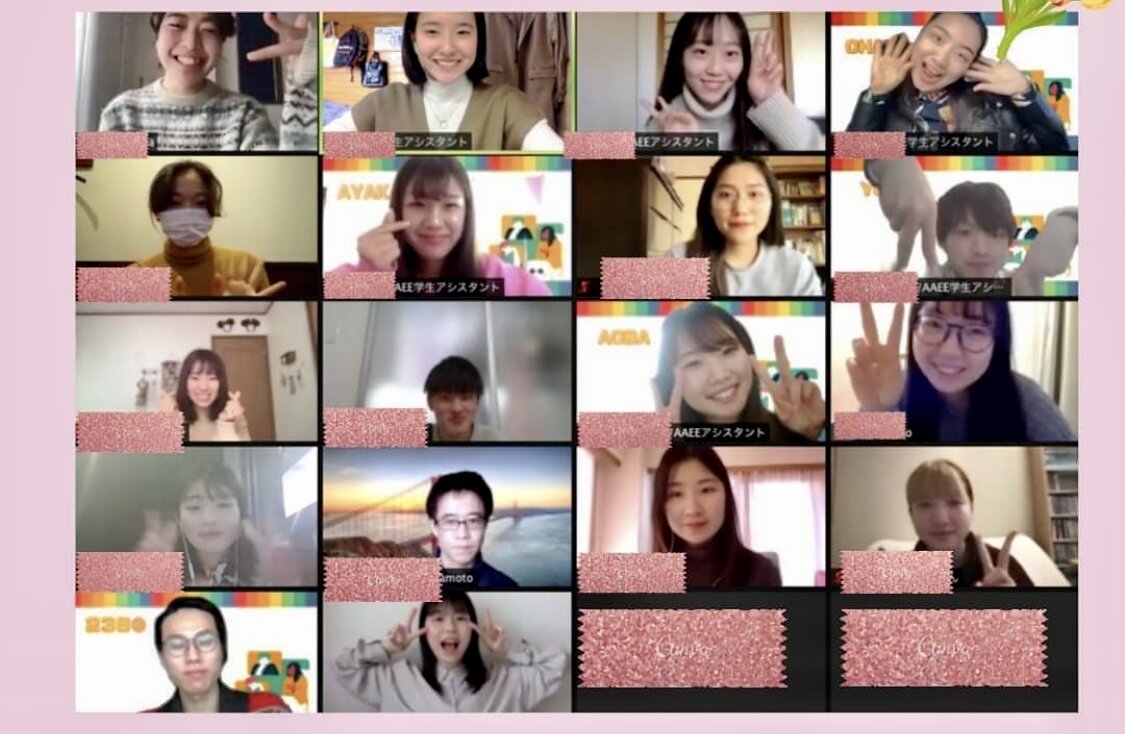

Mar, 2021

From February 25 (Thu.) to March 5 (Fri.), 2021, we held the "Spring Break Study Group on Multicultural Conviviality" organized by the AAEE Asian Educational Exchange and Research Organization. This program was positioned as a study group series on "Multicultural Conviviality" as a common issue, and was the first 7-day intensive program. Participants explored the current situation and issues in Japanese society from the perspective of "diversity" through watching video dialogues with people with diverse values and cultural backgrounds.
This year's topic was "From 'home' to 'outside'. Making Multicultural Conviviality a "Jibungoto". was the theme of the online session.
In the first part of the session, participants watched a video of a conversation between the guests of each session and Professor Akinori Seki of Tokyo Keizai University, who is the president of our organization. The first day featured Chisa Okayama on the theme of "Nature and Faith," the second day featured Rinkawa Miyashita on the theme of "Returning Students," the third day featured Momoko Sato on the theme of "Japanese Abroad," the fourth day featured Yuba Yoshikawa on the theme of "Veganism," the fifth day featured Aio Seki on the theme of "Personal Growth," and the sixth day featured On the sixth day, we welcomed Daichi Yamaoka and Chisato Mochizuki as our guests on the theme of "Happiness. Each session was rich in content, and it was impressive to see the participants taking notes without stopping. On the seventh day, as a summary, Professor Akinori Seki, the President, himself took the stage as a speaker to talk about the importance of dialogue.
In the second part of the session, the participants shared their opinions and impressions of the dialogue video with the other participants, and practiced digesting the learning in their own minds by assigning specific tasks. It was not an easy task for the participants to tackle such an ambiguous and difficult task, but I believe that they were able to gain more from the output than ever before.

In the post-workshop questionnaire, we received these comments from the participants. (Excerpt below)
I was able to look back on what I have learned and reconfirm what I want to do.
The various messages from Yoshiki Seki stuck in my mind and I learned a lot about life.
I was inspired by Ms. Okayama's wonderful way of living and thinking.
Because I was able to hear answers and opinions on things that I am interested in and that I have been struggling with.
Because it was linked to what I am currently thinking about my future.
It was good to be able to think about what I want to do and how I want to be on the topic of self-disclosure and human relations, which I am interested in.
I was very happy to be able to meet people I could only meet online. I would like to participate in the face-to-face program again!
It was very meaningful to hear the opinions of many people that I would not normally be able to interact with.
The one thing that all the guests had in common was that they "jumped into the environment in front of them and found out what they wanted to do. As a result, the guests continue to embody multiculturalism. In other words, multicultural conviviality is not only something we should aim for but also something we should always practice. Multicultural conviviality cannot be created through discussion alone. The power of action necessary for multicultural conviviality is to place yourself in diverse values and to remain honest to your own heart. If you were able to feel that in this program, there is no greater "success" than that.
I would also like to express my heartfelt gratitude to all the participants from all over Japan, including the guests who shared their valuable stories with us. I hope that this program has been a fruitful one for each of you.